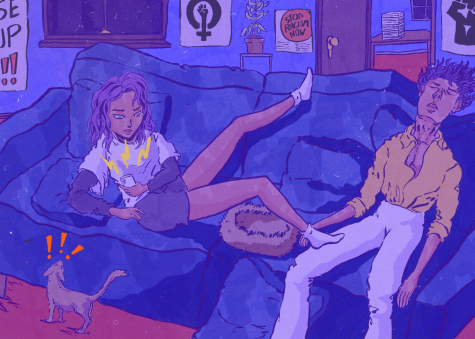A balancing act: How to avoid activism fatigue
April 9, 2021

When Abigail Bensel’s TikTok feed was nothing but political video after political video, they knew they needed to take a step back to unwind from the constant stream of news. After weeks of reading articles, re-sharing infographics and going to protests, they began to feel overwhelmed and exhausted.
“It’s so hard for me to unplug because that constant stream of information is so addicting for my brain,” said Bensel, a sophomore ASL-English Interpretation major. “The format is exhausting for me because … once a month, you’ll see a happy little cat video and then it’ll be this awful horrible thing that’s happening.”
Bensel experienced burnout due to her activism, a phenomenon that can lead to serious issues over time.
“It also has a psychological component,” said Olga Goldenberg, assistant professor in the Humanities, History, and Social Sciences Department. “It leads to lack of interest, motivation, energy. It can lead to low mood, decreased creativity and it can lead to insomnia—which is both physical and psychological.”
Currently, Bensel’s “For You” page, TikTok’s personalized recommendation feed, has been a mix of sign language and deaf-activism content, plus videos regarding the current political climate.
Bensel said they have been to four protests during the spring and summer of 2020, all for the Black Lives Matter movement and bringing awareness to police brutality.
During their time protesting, Bensel said they felt empowered that they could use their voice to uplift others.
“I was so happy I was able to do something that I believed in, especially coming out as so many people aren’t because they’re disabled or because of COVID,” they said.
But over time, the energy that comes from activism can turn into mental and physical exhaustion.
Goldenberg said some of the signs of burnout can be stress, anxiety, fatigue and difficulty focusing.
“[Burnout] can have consequences, not just on school itself but also in other areas of one’s life,” Goldenberg said.
Bensel said when it comes to managing stress from content overload, their go-to destress methods are unplugging and meditating, taking a nap or showering.
To prevent burnout altogether, Goldenberg said, knowing what to prioritize and knowing one’s limits are key.
“It’s not just physical burnout, it’s a mental and spiritual burnout too,” said Jae Rice, director of communications at Brave Space Alliance. “How many times do I have to see these cops attack us? How many times do I have to hear so many oppositions for our liberation? … These actions are revolved around death. It gets heavy seeing people who look like me being gunned down in the streets. It gets heavy to constantly be out here marching for the same things that my grandparents were marching for.”
Rice said he has made it a habit to meditate before protests to ground himself better, but advises people find what works best for them and to know their own limits.
Brave Space Alliance is the first and only Black-led, all LGBTQ+ center on Chicago’s South Side, serving the South and West side communities, specifically marginalized communities.
Nasim Ellahi, a sophomore graphic design major, said when his social media feeds get overwhelming, he likes to unplug and keep himself busy with other hobbies. Turning off his phone to paint or cook helps keep him busy and productive, while also allowing a break from the overload of news on his phone.
While he has not been to a protest himself, Ellahi has been actively using his Instagram to share posts, regarding information and resources, to communities that need them. He said it is important to use whatever platforms are available to spread the word about certain social and political issues.
“It’s easy to get wrapped up in the moment when you see our oppressors treating us the way that we’re being treated, but be honest with yourself and honest with what you can do,” Rice said. “If you have to sit one out, that’s fine. It’s fine if you have to support in other ways.”







